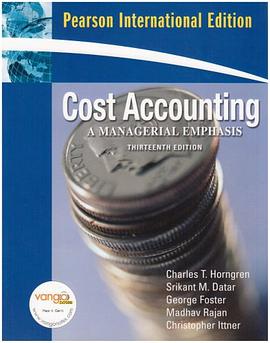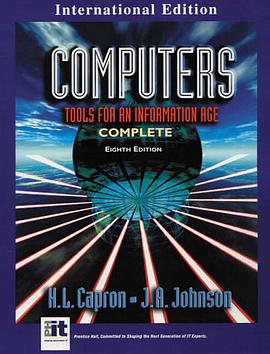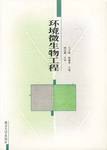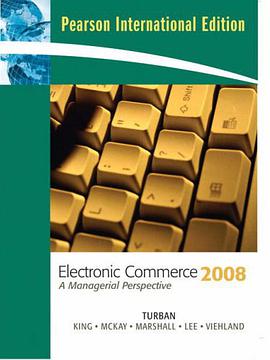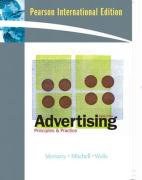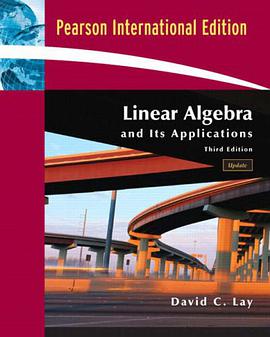
具体描述
Linear algebra is relatively easy for students during the early stages of the course, when the material is presented in a familiar, concrete setting. But when abstract concepts are introduced, students often hit a brick wall. Instructors seem to agree that certain concepts (such as linear independence, spanning, subspace, vector space, and linear transformations), are not easily understood, and require time to assimilate. Since they are fundamental to the study of linear algebra, students' understanding of these concepts is vital to their mastery of the subject. Lay introduces these concepts early in a familiar, concrete Rn setting, develops them gradually, and returns to them again and again throughout the text so that when discussed in the abstract, these concepts are more accessible.
MyLab或是Mastering系列是在线作业系统。Access Code Card是在线作业系统的访问码,是老师和学生课堂之外网络互动及交流的平台,个人是无法使用这个平台的。请读者注意您购买的这个ISBN是不带Access Code Card的。
作者简介
David C. Lay holds a B.A. from Aurora University (Illinois), and an M.A. and Ph.D. from the University of California at Los Angeles. Lay has been an educator and research mathematician since 1966, mostly at the University of Maryland, College Park. He has also served as a visiting professor at the University of Amsterdam, the Free University in Amsterdam, and the University of Kaiserslautern, Germany. He has over 30 research articles published in functional analysis and linear algebra.
As a founding member of the NSF-sponsored Linear Algebra Curriculum Study Group, Lay has been a leader in the current movement to modernize the linear algebra curriculum. Lay is also co-author of several mathematics texts, including Introduction to Functional Analysis, with Angus E. Taylor, Calculus and Its Applications, with L.J. Goldstein and D.I. Schneider, and Linear Algebra Gems-Assets for Undergraduate Mathematics, with D. Carlson, C.R. Johnson, and A.D. Porter.
Professor Lay has received four university awards for teaching excellence, including, in 1996, the title of Distinguished Scholar-Teacher of the University of Maryland. In 1994, he was given one of the Mathematical Association of America's Awards for Distinguished College or University Teaching of Mathematics. He has been elected by the university students to membership in Alpha Lambda Delta National Scholastic Honor Society and Golden Key National Honor Society. In 1989, Aurora University conferred on him the Outstanding Alumnus award. Lay is a member of the American Mathematical Society, the Canadian Mathematical Society, the International Linear Algebra Society, the Mathematical Association of America, Sigma Xi, and the Society for Industrial and Applied Mathematics. Since 1992, he has served several terms on the national board of the Association of Christians in the Mathematical Sciences.
目录信息
A Note to Students
Chapter 1 Linear Equations in Linear Algebra
Introductory Example:Linear Models in Economics and Engineering
1.1 Systems of Linear Equations
1.2 Row Reduction and Echelon Forms
1.3 Vector Equations
1.4 The Matrix Equation Ax = b
1.5 Solution Sets of Linear Systems
1.6 Applications of Linear Systems
1.7 Linear Independence
1.8 Introduction to Linear Transformations
1.9 The Matrix of a Linear Transformations
1.10 Linear Models in Business,Science,and Engineering
Supplementary Exercises
Chapter 2 Matrix Algebra
Introductory Example: Computer Models in Aircraft Design
2.1 Matrix Operations
2.2 The Inverse of a Matrix
2.3 Characterizations of Invertible Matrices
2.4 Partitioned Matrices
2.5 Matrix Factorizations
2.6 The Leontief Input—Output Model
2.7 Applications to Computer Graphics
2.8 Subspaces of Rn
2.9 Dimension and Rank
Supplementary Exercises
Chapter 3 Determinants
Introductory Example: Determinants in Analytic Geometry
3.1 Introduction to Determinants
3.2 Properties of Determinants
3.3 Cramer’s Rule, Volume, and Linear Transformations
Supplementary Exercises
Chapter 4 Vector Spaces
Introductory Example: Space Flight and Control Systems
4.1 Vector Spaces and Subspaces
4.2 Null Spaces, Column Spaces, and Linear Transformations
4.3 Linearly Independent Sets; Bases
4.4 Coordinate Systems
4.5 The Dimension of a Vector Space
4.6 Rank
4.7 Change of Basis
4.8 Applications to Difference Equations
4.9 Applications to Markov Chains
Supplementary Exercises
Chapter 5 Eigenvalues and Eigenvectors
Introductory Example: Dynamical Systems and Spotted Owls
5.1 Eigenvectors and Eigenvalues
5.2 The Characteristic Equation
5.3 Diagonalization
5.4 Eigenvectors and Linear Transformations
5.5 Complex Eigenvalues
5.6 Discrete Dynamical Systems
5.7 Applications to Differential Equations
5.8 Iterative Estimates for Eigenvalues
Supplementary Exercises
Chapter 6 Orthogonality and Least Squares
Introductory Example: Readjusting the North American Datum
6.1 Inner Product, Length, and Orthogonality
6.2 Orthogonal Sets
6.3 Orthogonal Projections
6.4 The Gram—Schmidt Process
6.5 Least-Squares Problems
6.6 Applications to Linear Models
6.7 Inner Product Spaces
6.8 Applications of Inner Product Spaces
Supplementary Exercises
Chapter 7 Symmetric Matrices and Quadratic Forms
Introductory Example: Multichannel Image Processing
7.1 Diagonalization of Symmetric Matrices
7.2 Quadratic Forms
7.3 Constrained Optimization
7.4 The Singular Value Decomposition
7.5 Applications to Image Processing and Statistics
Supplementary Exercises
Chapter 8 The Geometry of Vector Spaces
(Online Only)
Chapter 9 Optimization
(Online Only)
Appendixes
A Uniqueness of the Reduced Echelon Form
B Complex Numbers
Glossary
Answers to Odd-Numbered Exercises
Index
· · · · · · (收起)
读后感
PCA这么重要的东西应该与SVD一样专门写一段,而不是放在“7.5 图像处理和统计学中的应用”底下当成普通例子来写。虽然这里PCA写的是真清晰真透彻,秒杀网上无数介绍。另外,SVD讲的太简略了,看完公式也抓不住本质。最好加入几何理解角度,并谈谈与PCA的异同。
评分一本非常好的线性代数基础书。 从考研以后,那些不常用到的数学知识变开始逐渐淡忘、褪色。最近对机器学习产生了兴趣,因此又重新开始温习线性代数。 这本书的内容跟中国的教材相比,并没有增加多少,甚至有些东西还有欠缺。但是跟国内图书的不同在于,它详细的讲解了每个公式...
评分看过了介绍后,感觉比较适合我。 本书是一本优秀的现代教材,给出最新的线性代数基本介绍和一些有趣应用。
评分看过了介绍后,感觉比较适合我。 本书是一本优秀的现代教材,给出最新的线性代数基本介绍和一些有趣应用。
用户评价
这本书在算法和计算方法的介绍上,显得极其过时和不完整,这在当今这个计算能力飞速发展的时代,是一个巨大的硬伤。它似乎停留在上世纪八九十年代的教学标准上,对现代数值计算库和编程语言的实践应用几乎是零提及。当我们在谈论如何求解一个大型稀疏线性系统时,这本书仍然聚焦于理论上精确但实践中效率低下的高斯消元法,却对迭代法、预处理技术或者现代线性代数软件库(如LAPACK或Eigen)的实际操作逻辑避而不谈。对于一个期望将线性代数知识转化为工程或数据科学能力的读者来说,这种知识的“陈旧”是无法容忍的。我需要知道,在实际操作中,我们如何处理浮点误差,如何评估计算的稳定性和收敛速度,这些是纯理论推导无法提供的宝贵经验。期望读者在学完这些理论后,能自行去探索现代计算工具的复杂性,未免太过理想化了。一本现代的教材,应该更平衡地整合理论的严谨性和计算的实用性,让读者在理解“是什么”的同时,也能掌握“怎么做”以及“为什么现在都这么做”。这本书在这方面的缺失,使得它更像是一部历史文献,而非一个面向未来的学习指南。
评分这本书的排版和视觉呈现,简直是一场对读者注意力的折磨。我并非一个对装帧设计吹毛求疵的人,但面对这本厚重的砖头书,我感到了一种强烈的视觉疲劳。字体的选择,尤其是公式和符号的呈现方式,显得极其拥挤和局促,仿佛印刷厂为了节省几页纸而将所有内容都塞进了有限的空间里。更要命的是,图表的质量,简直是灾难性的。那些本应清晰展示几何意义或向量空间的图形,模糊不清,线条粗糙,比例失调,有时甚至分不清哪个轴代表哪个变量。在描述线性变换时,我需要不断地翻阅前后页码,试图在文字描述和简陋的插图之间建立起可靠的对应关系,这个过程耗费了我远超理解数学概念本身的时间。清晰的图示是理解高维空间几何直觉的生命线,而这本书似乎完全忽视了这一点。想象一下,当你在努力理解一个复杂的投影操作时,却被一张看起来像是用老式点阵打印机打印出来的草图所困扰,那种体验,简直是双重的打击。如果说数学是严谨的艺术,那么这本书的视觉呈现,就是一场拙劣的速写,完全辜负了内容本身可能具有的深刻性。我甚至开始怀疑,如果作者在编写这本书时,对视觉信息的传达都如此敷衍,那么他们在构建数学逻辑时的细致程度又能高到哪里去?
评分我最近拿起了一本据说是经典之作的数学教材,希望能在上面找到通往高深领域的一把钥匙,但这次经历,怎么说呢,像是在一片浓雾中摸索前行,收获寥寥。这本书的叙事方式,坦白讲,有些过于学术化,仿佛作者写给的不是一个正在学习的个体,而是一群已经掌握了所有基础概念的同行。每一个章节的展开,都缺乏那种循序渐进的引导,很多关键的跳跃性思维直接呈现在读者面前,留下了一个个需要自己去填补的巨大鸿沟。我花了大量时间去理解为什么某个定理会以这种形式被构建出来,而不是寻求一个更直观的理解路径。书中的例题设计也令人困惑,它们往往是高度抽象的、脱离实际应用场景的纯数字游戏,读完之后,我依然无法将那些复杂的矩阵运算与任何现实世界的问题建立起有意义的联系。比如在谈到特征值和特征向量时,书里罗列了大量的计算步骤,却几乎没有提及这些概念在数据压缩、量子力学或者图形学中到底扮演了怎样的核心角色。这种纯粹的理论堆砌,对于我这种需要通过“看见”才能“理解”的学习者来说,无疑是极大的障碍。感觉更像是在阅读一本为已经精通此道的人准备的参考手册,而不是一本旨在启迪和引导新手的入门读物。整个阅读过程下来,收获的不是豁然开朗的喜悦,而是深深的挫败感,让人不禁怀疑,是不是自己根本就不适合走这条路。
评分从作者的写作语气和对学科历史的引入来看,这本书似乎完全沉浸在一种自我满足的学术氛围中,对读者的学习困境表现出一种近乎傲慢的疏离感。全书的语调是那种不容置疑的、陈述事实的权威性,几乎没有采用任何鼓励性的措辞,或者引导性的提问来激发读者的好奇心。它没有试图将读者拉入一个探索数学真理的激动人心的旅程,反而更像是在宣读一份古老的法典。这种单向度的信息传输方式,极大地削弱了学习的主动性和乐趣。我尝试着去寻找一些脚注或者侧边栏,看看作者是否会分享一些关于某个数学家发现某个定理时的“顿悟时刻”,或者他们在推导过程中遭遇的困难,这些“人味儿”的元素往往能让冰冷的理论变得鲜活起来。然而,这本书对此几乎是完全免疫的,它呈现的是一个完美无瑕的、最终定稿的数学体系,仿佛它是一件从天而降的成品,而不是一个在无数次失败和修正中诞生的、充满智慧的人类结晶。这种缺乏人情味的呈现,让整个阅读体验变得枯燥乏味,学习过程不再是一种发现的乐趣,而更像是一项艰苦的、缺乏回报的苦役。
评分这本书在处理抽象概念和具体实例之间的平衡上,犯下了几乎是致命的错误。它似乎患上了一种“抽象症”,对那些需要依托具体情境才能被真正消化的理论避而不谈,或者仅仅是蜻蜓点水地提一下。例如,在讲解正交化过程时,书里花费了大量的篇幅来推导格拉姆-施密特过程的代数形式,每一个步骤都进行了一丝不苟的证明,但就是不愿花点笔墨解释,在信号处理或者最小二乘拟合中,这种正交基的构建究竟解决了什么实际问题,它带来的计算优势在哪里。对于我这样的应用导向的学习者来说,缺乏“为什么”的支撑,这些“如何做”的步骤很快就会被大脑标记为不重要的短期记忆而丢弃。我渴望看到的是,某一个复杂的线性代数工具是如何被一个工程师或一个科学家巧妙地嵌入到他们的模型中,解决了一个原本看似无法逾越的障碍。然而,这本书提供给我的,是一堆精美打磨、但完全没有安装接口的数学零件。结果就是,每当我试图将学到的知识应用到任何一个稍微偏离课本设定的情景中时,我都会感到无从下手,仿佛我只是学会了如何模仿书本上的计算模板,而没有真正掌握其背后的思维模式和应用哲学。
评分an expensive book。不过整体还是不错的,彩色的。
评分an expensive book。不过整体还是不错的,彩色的。
评分an expensive book。不过整体还是不错的,彩色的。
评分an expensive book。不过整体还是不错的,彩色的。
评分an expensive book。不过整体还是不错的,彩色的。
相关图书
本站所有内容均为互联网搜索引擎提供的公开搜索信息,本站不存储任何数据与内容,任何内容与数据均与本站无关,如有需要请联系相关搜索引擎包括但不限于百度,google,bing,sogou 等
© 2026 qciss.net All Rights Reserved. 小哈图书下载中心 版权所有






